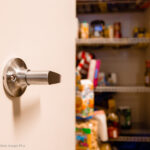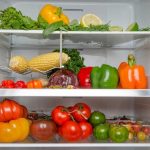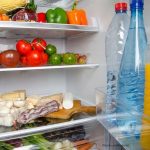Electrolux Frigidaire Side By Side Refrigerators are being recalled for possible choking and laceration hazards. The problem is the ice bucket assembly component can break, resulting in plastic pieces entering the ice bucket. There have been 343 reports of plastic pieces breaking off, including two incidents resulting in laceration and ingestion injuries. The refrigerators were manufactured in Mexico. The importing firm is Electrolux Home Products Inc. of Charlotte, North Carolina. The recall is for certain Electrolux Frigidaire side by side refrigerators with slim ice buckets that were manufactured between 2015 and 2019. They were sold in various colors. The model numbers of the recalled refrigerators are DGHK2355TF, DGHX2655TF, FFSC2323TS, FGSC2335TD, FGSC2335TF, FGSS2635TD, … [Read more...]
Checklist for Cleaning Your Pantry and Refrigerator From USDA
It's time for spring cleaning in the northern hemisphere, and one place food safety conscious consumers should focus is the kitchen. Your pantry and refrigerator can harbor pathogens and should be regularly cleaned and sanitized. The USDA is offering a checklist for cleaning your pantry and refrigerator. Your refrigerator should always be set between 34°F and 40°F. Any higher and pathogens should grow, and any lower and food could freeze and lose quality. Many newer refrigerators do have built-in thermostats so you can check the temp, but if your doesn't, an inexpensive thermometer is available most everywhere. To keep your fridge clean, follow these steps. Always clean spills immediately with warm, soapy water. Don't use solvent cleaning agents or abrasives, since the fumes from … [Read more...]
Prepare For Food Safety During Power Outages WIth Tips From the FDA
As the U.S. enters the hurricane and tornado season, the FDA is offering tips for helping consumers prepare for food safety during power outages. Food can spoil if the power is out for hours, but you can save money and protect yourself by following these steps. First, make sure that you have appliance thermometers in your refrigerator and freezer. That's the best way to tell if the temperature in those appliances is cold enough to keep food safe from bacterial growth. The freezer should always be at 0°F or below, and the refrigerator should always be at or below 40°F. Then, think about freezing containers of water to help keep foods cold in the freezer, refrigerator, or coolers when the power goes out. The melting ice will also provide drinking water if you use water from the … [Read more...]
Do You Know How Long Foods Can Be Stored in the Fridge or Freezer?
Because of the coronavirus pandemic, many people are buying more food than they can eat in a week, or even in a month. While hoarding food is not helping the situation, these actions can help people feel safer. While nonperishable foods such as canned and shelf-stable products can be stored without worrying about food safety, do you know how long foods can be stored in the fridge or freezer? Foodsafety.gov has the answer with a chart. First, a note about expiration dates. Most of these dates, especially for canned foods or shelf stable foods, refer to the quality of the food, not to possible bacterial contamination. So if you have a can of peas that are past the "best if used by" date stamped on the can, you can still eat them; the peas just won't have a good color and the flavor … [Read more...]










